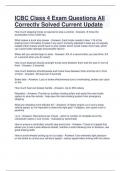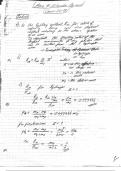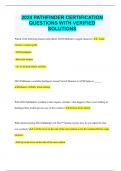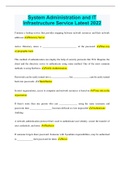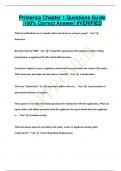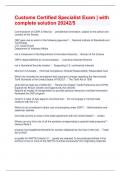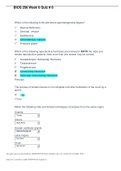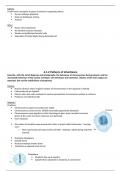Correctly Solved Current Update
How much stopping forces is required to stop a vehicle - Answers -9 times the
acceleration force (4,000 hp)
What makes a truck stop slower - Answers -Each brake needs to take 1/16 of the
braking force (16 brakes, 8 axles if any aren't correctly adjusted if axles are not equally
loaded (other brakes would have to work harder which would create more heat, which
can cause brake damage and possible failure)
When will you vehicle begin to slow - Answers -3/4 of a second after you see-think, 3/4
of. a second when you do (react)
How much distance should cars/light trucks have between them and the cars in front of
them - Answers -2 seconds
How much distance should busses and trucks have between them and the car in front
of them - Answers -No less than 5 seconds
Brake fade - Answers -Loss of brake effectiveness due to overheating, brakes can catch
on fire
How much heat can brakes handle - Answers -Up to 250 celsius
Retarders - Answers -Provide an auxiliary slowing effect and assist the main brake
system to slow the vehicle - help save the main braking system from emergency
stopping
What are retarders more efficient at? - Answers -A higher engine r.p.m and a lower
vehicle speed, so it's important to select the right gear -if slippery, can cause truck to
jackknife
r.p.m - Answers -Revolutions per minute - refers to number of complete turns the
crankshaft makes in one minute - indicated by tachometer
How to ensure a controlled, smooth stop every time - Answers -Travel at a speed that
allows you to see a safe distance ahead, maintain a safe following time or distance, use
good braking skills
How to avoid wheels locking up on icy roads - Answers -Use extremely light pressure
on the brake to control your vehicle's speed - reduce speed when driving with tire chains
, What are the most common causes of brake failure and downhill runaway crashes -
Answers -Overdriving the ability of the brakes to deal with the heat (poor speed control)
What should you never do on a downgrade - Answers -Shift to a higher gear (unless the
speed on the grade can be controlled with a retarding device or engine compression
What do signs with a percentage and a truck going downhill mean - Answers -Shows
the steepness of the grade - the higher the percentage, the steeper the hill (18% is very
steep)
When are engine retarders most effective - Answers -At a higher r.p.m and when
transmission is in a low gear
How to control speed if you are going too fast - Answers -Apply the brakes enough to
reduce speed by 10 to 15 km/h (the brakes are cold at this point), downshift to a lower
main gear
How to drive through water when necessary - Answers -Cover the brake pedal with your
foot as you approach the water, place a slight drag which will reduce amount of water
entering brake drums and shoes
What can happen when cargo area is empty and there's no ABS - Answers -The vehicle
wheels may bounce and lock up
What can happen when you apply brake pressure too forcefully or only to the trailer
brakes on a slippery road - Answers -Wheels can lock up which can result in a skid or
jackknife
What does ABS help prevent - Answers -Helps prevent wheel lockup or skids caused by
over braking on slippery road surfaces - doesn't allow you to drive faster or stop sooner.
Also prevents jackknifing
Emergency stopping with ABS - Answers -Firm, continuous pressure to the brake pedal
until vehicle is stopped, don't pump brakes (turns vehicle on and off), don't be alarmed
by noise
Automatic Traction Control (ATC) - Answers -Optional addition to an ABS system, uses
the pulsating signal from the speed sensors to detect loss of drive wheel traction on
slippery road surfaces - will apply the brakes (has info decal on dashboard and dash
mounted lamp that will light if wheel spin occurs)
What percent of greenhouse gas emissions are produced by the road transportation
sector - Answers -27 percent
When should you increase following distance - Answers -When road conditions are less
than ideal

